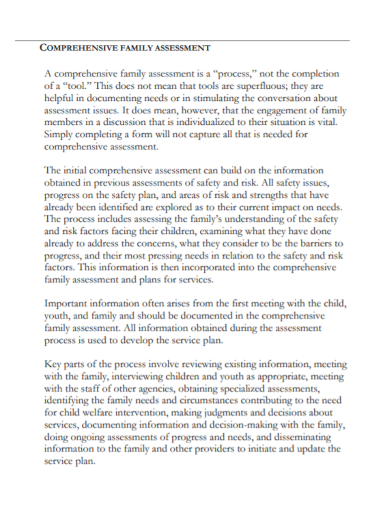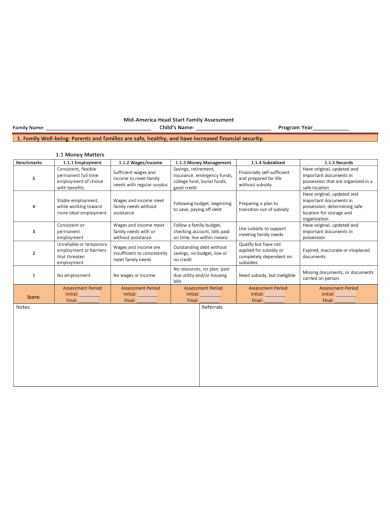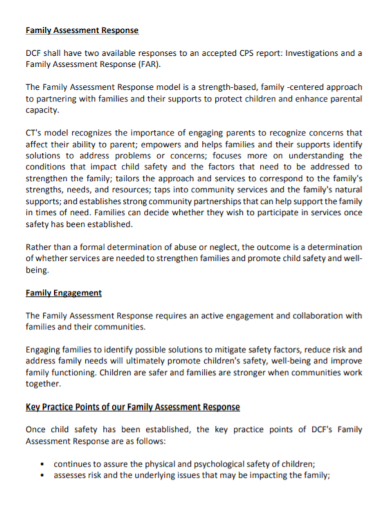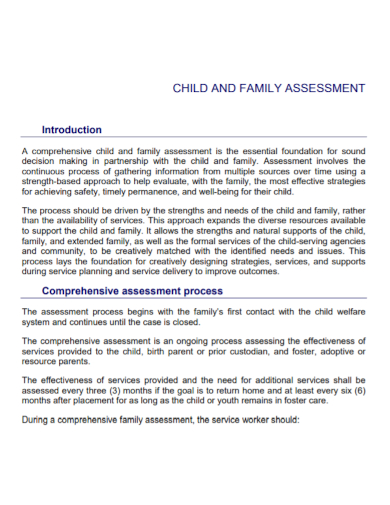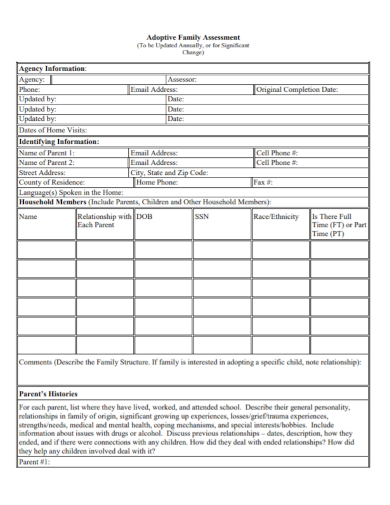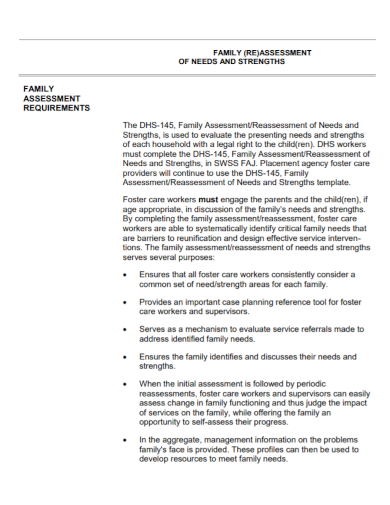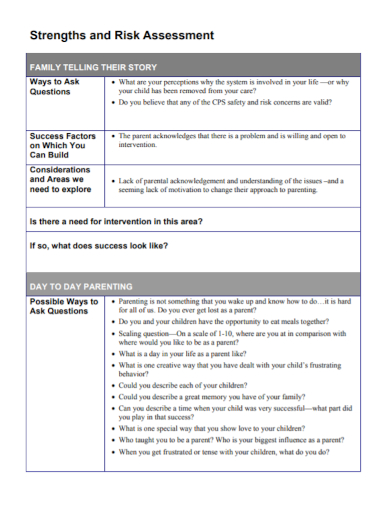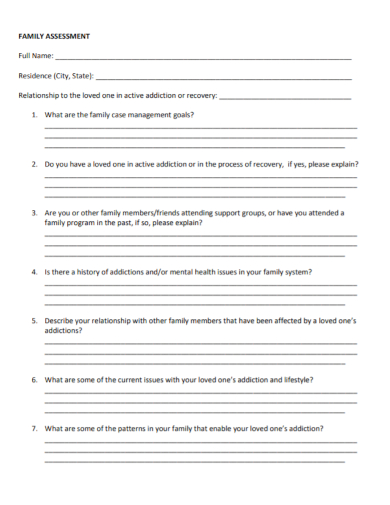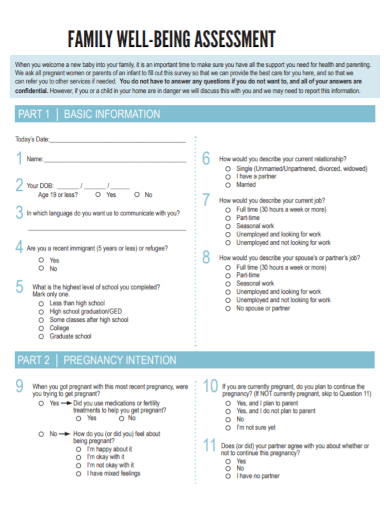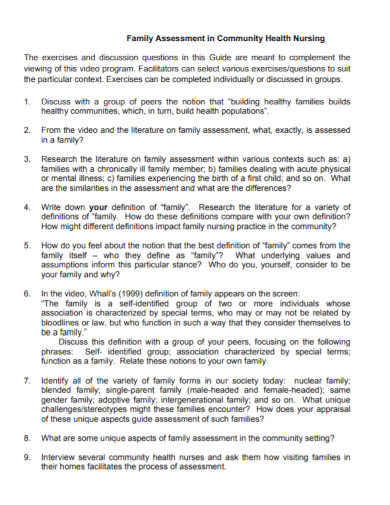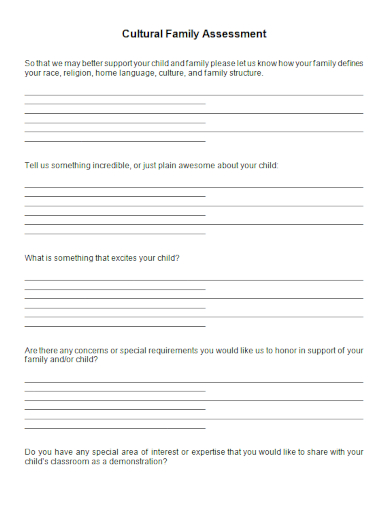Family plays a very essential role in determining the health of the individuals and groups within a specific community. One of the best ways to know a particular family is to conduct a family assessment. It offers providers every opportunity to keep their eyes on the family to be able to understand who they are. Based on some given theoretical frameworks, the family assessment has components where you have to include and know about the daily life of a family as well as the type of environment in which they live. Aside from that, it also provides information that can be beneficial for determining potential goals and interventions. This process is voluntary. This means that the family may share their details about themselves or not. In this article, you will be able to know about what a family assessment actually is.
10+ Family Assessment Samples
1. Comprehensive Family Assessment
2. Head Start Family Assessment
3. Family Response Assessment
4. Child and Family Assessment
5. Adoptive Family Assessment
6. Family Assessment of Needs
7. Family Risk Assessment
8. Family Assessment Form
9. Family Well Being Assessment
10. Community Health Family Assessment
11. Cultural Family Assessment
What is a Family Assessment?
A family assessment is a type of practice that enhances your decision-making skills by being able to identify, consider, and weigh several factors that would be giving an impact to the children and their families. This would occur from the time that the children and their families focus on the child welfare system or in a case closure. There are several factors including child’s safety, risk of maltreatment, protective capacity of parents, and well-being of a child that should be assessed accurately.
Most of this type of assessment is conducted on an ongoing basis. This assessments provide foundation to every children and families at a number of specific critical points like when the families are faced with new challenges, when there would be safety concerns for the children and other members of the family, when decisions are made about their need of the services or in the level of intensity of interventions, and when having to review specific services based on their effectiveness and progress.
When you are observing a comprehensive family assessment, you would notice that it is being guided by the principles of family-centeredness and culturally competent practice. Families provide the best care and protection for each of the members. They represent focus and each of the members are responsible for implementing the development of a plan. It is always necessary to keep the respect and consideration within the aspects of culture, ethnicity, values, race, and customs.
Family Assessment Tools
There are a lot of known family assessment tools that can be used in conducting the process. Each of the tools will help in collecting information pertaining to culture, functioning, family systems, and experiences. Regardless of what tool you have selected, there are several key ideas that you would want to consider when selecting for a tool suited for each family.
- timing – it could be before of at the start of the service delivery or during intervention to be able to assess its effectiveness
- method – includes checklists, questionnaire, and conversation
- data collected – this includes family interests, concerns, traditions, activities, resources, and priorities
- developmental framework
- reporting method
- requirements both from early intervention and childhood provider
- comfortable for family
Having feedbacks and information will enable a family assessment to feed directly into the service delivery. It should be able to engage each of the members of the family especially in conversations to consider the present, future and the upcoming challenges.
FAQs
What are the benefits of family based assessments?
It helps in facilitating the participation of a certain family, helps providers to understand the strengths, goals, and priorities of a family, helps identify the family system and their resources, helps in trying to reflect their choices, and reflects their needs.
What type of information should you include in the assessment?
You should include the psychological and biological information and the data pertaining to the family’s social system.
What are included in the family’s social system?
It includes extended family, school, workplace, and recreational activities.
If you want to see more samples and formats, you can check out the family assessment samples and templates to be guided.
Related Posts
FREE 10+ Nursing Assessment Form Samples
FREE 9+ Sample Needs Assessment Survey
FREE 8+ Sample Mental Health Assessments
FREE 8+ Sample Psychosocial Assessments
FREE 8+ Sample Physical Assessment Forms
FREE 8+ Sample Family Medical Leave Act Forms
FREE 7+ Sample Health Assessments
FREE 6+ Company Profile Samples for Small Businesses
FREE 5+ Sample Best Ecomap
FREE 34+ Assessment Samples
FREE 12+ Observation Checklist Samples
FREE 10+ Child Care Risk Management Plan Samples
FREE 9+ Vendor Evaluation Samples
FREE 7+ Sample Army Counseling Forms
FREE 7+ Legal Assistant Cover Letter Templates

